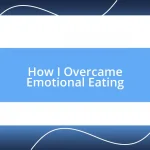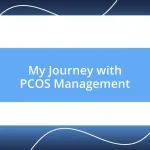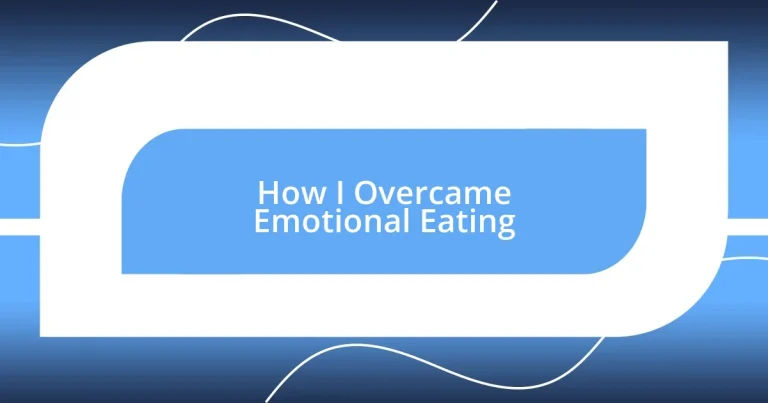Key takeaways:
- Emotional eating is often tied to feelings of stress, loneliness, and nostalgia, necessitating the identification of personal triggers to better manage cravings.
- Developing healthy coping mechanisms, such as mindfulness practices and journaling, can effectively redirect focus away from food and foster emotional understanding.
- Creating a supportive environment and celebrating small milestones in recovery reinforces progress and encourages sustained healthy choices.
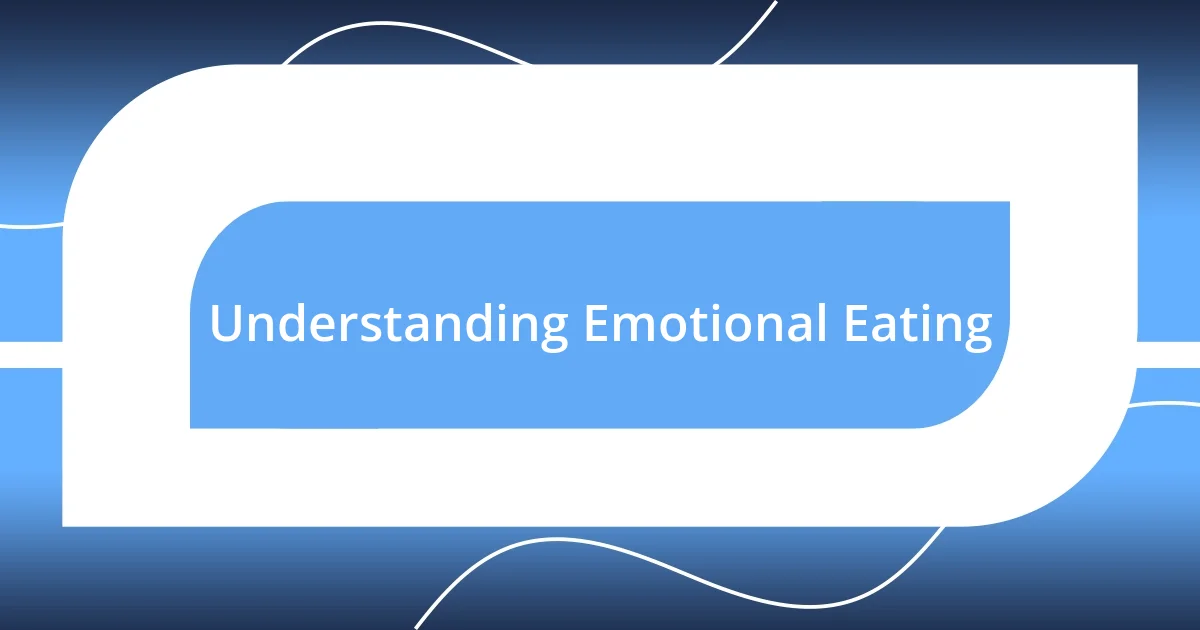
Understanding Emotional Eating
Emotional eating can often feel like a comforting refuge in times of turmoil. I remember a particularly stressful period at work when I would find myself reaching for snacks late at night, feeling that labyrinth of anxieties dissolve momentarily with each bite. Have you ever found yourself munching mindlessly while scrolling on your phone, only to realize you weren’t even hungry?
It’s fascinating—and a bit unsettling—how closely our emotions and eating habits are intertwined. For me, every birthday celebration would trigger a whirlwind of memories, and suddenly, I was indulging in cake not just for the sweetness but to soothe the surge of nostalgia. What underlying feelings surface for you when you indulge in certain foods?
Understanding that emotional eating is more than just a habit is crucial. It can be a response to stress, loneliness, or even boredom. I once discovered that my go-to comfort food, warm mac and cheese, wasn’t just about the taste but a subconscious longing for the warmth of family dinners from my childhood. Have you ever considered what emotions drive your cravings?
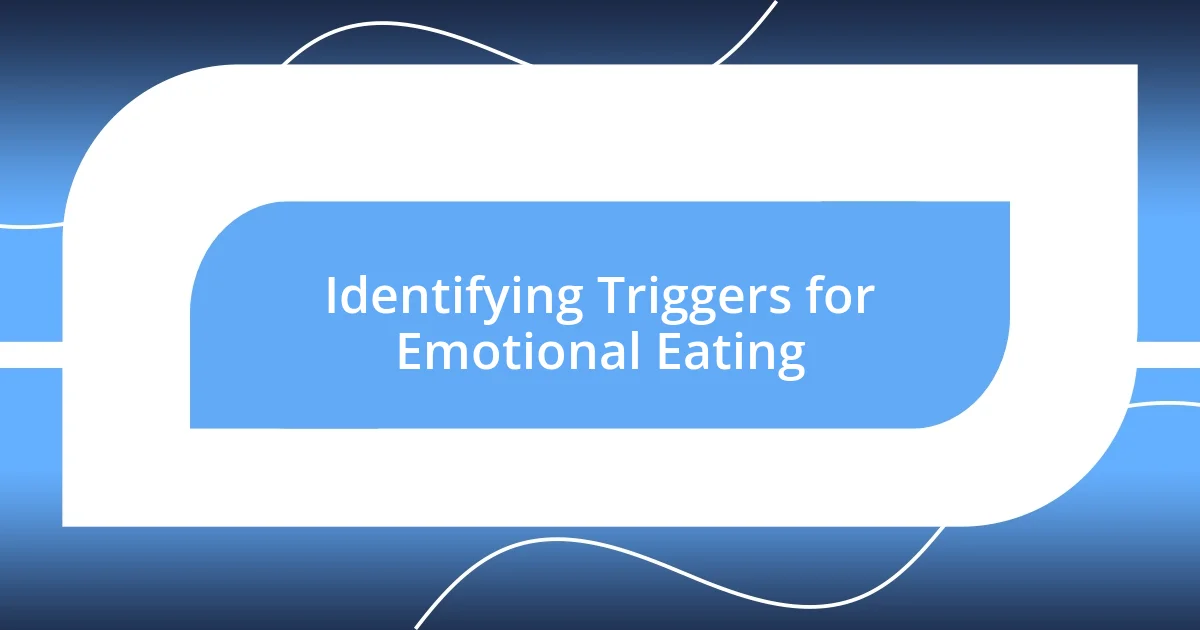
Identifying Triggers for Emotional Eating
Identifying the triggers for emotional eating is essential in understanding this complex behavior. I realized that my triggers often arose during moments of high stress or loneliness. For instance, after a tough day at work, I would unconsciously reach for cookies, associating them with comfort. Recognizing this pattern helped me to pause and reflect on my feelings instead of processing them through food.
Sometimes, I noticed certain environments could also spark my desire to eat emotionally. I recall a friend gathering where laughter filled the air, yet I felt out of place. Instead of joining in, I found myself snacking constantly to fill a void. It’s intriguing how social dynamics can influence our eating habits; have you ever felt compelled to eat more when surrounded by friends or family?
Eventually, I began keeping a food journal to map my emotions alongside my eating patterns. This exercise opened my eyes to the situations that prompted my cravings, such as when I felt anxious about future plans. By putting the spotlight on these triggers, I started finding healthier ways to cope with my emotions without relying solely on food.
| Trigger Type | Example |
|---|---|
| Stress | Reaching for snacks after a tough workday |
| Social Influence | Eating more at gatherings due to feeling out of place |
| Loneliness | Grabbing comfort food during quiet evenings at home |
| Nostalgia | Indulging in family recipes while missing home |
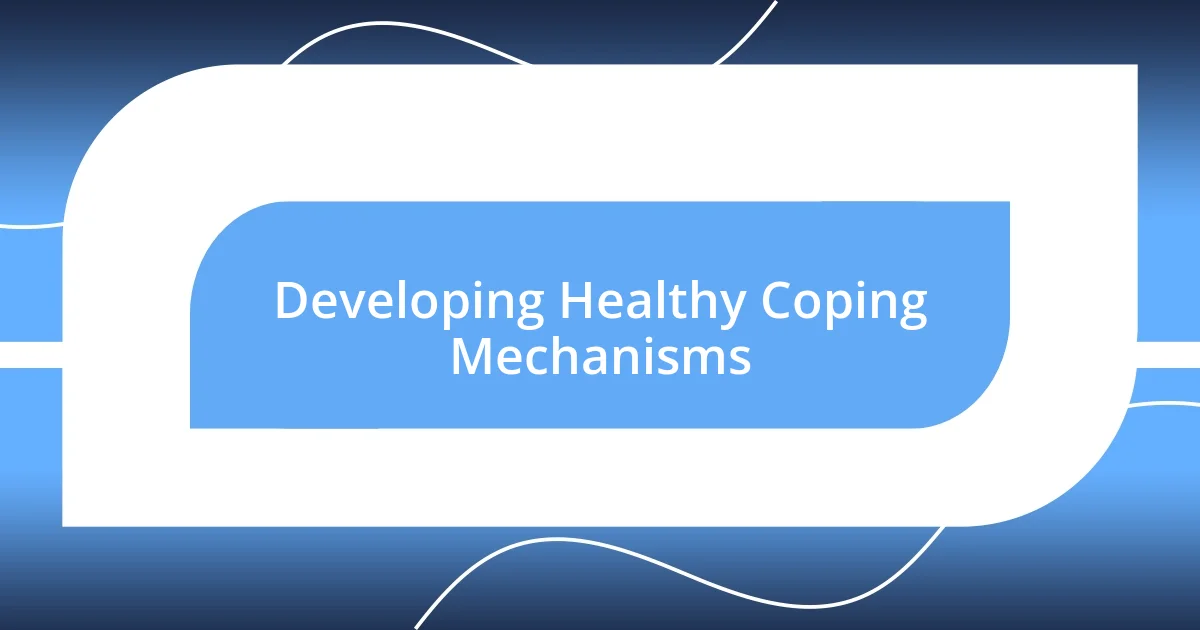
Developing Healthy Coping Mechanisms
Developing healthy coping mechanisms is a game changer when it comes to overcoming emotional eating. During my journey, I stumbled upon various strategies that have not only redirected my focus but also added depth to my emotional understanding. One particularly effective approach was embracing mindfulness practices, which helped me become more in tune with my feelings rather than yielding to the urge to snack. Instead of turning to food, I now use journaling as a way to express and process my emotions. It’s amazing how writing down my thoughts can turn a moment of stress into a clearer perspective.
Here are some healthy coping mechanisms I’ve found beneficial:
- Mindfulness Meditation: Taking just a few minutes to breathe and center myself can shift my emotional state.
- Physical Activity: I often opt for a walk or yoga session when I feel overwhelmed, as it releases those feel-good endorphins.
- Creative Outlets: Painting or crafting has become my go-to for channeling emotions without food.
- Healthy Snacking Choices: When I do feel the need to snack, I focus on nourishing options, like fresh fruit or nuts, instead of reaching for junk food.
- Talking It Out: I’ve learned the importance of sharing my feelings with friends or a therapist, which lightens the emotional load.
By incorporating these strategies into my daily routine, I’ve built a toolkit for managing my emotions that doesn’t rely on food. It’s a constantly evolving process, but each small step brings me closer to understanding myself and my needs better.
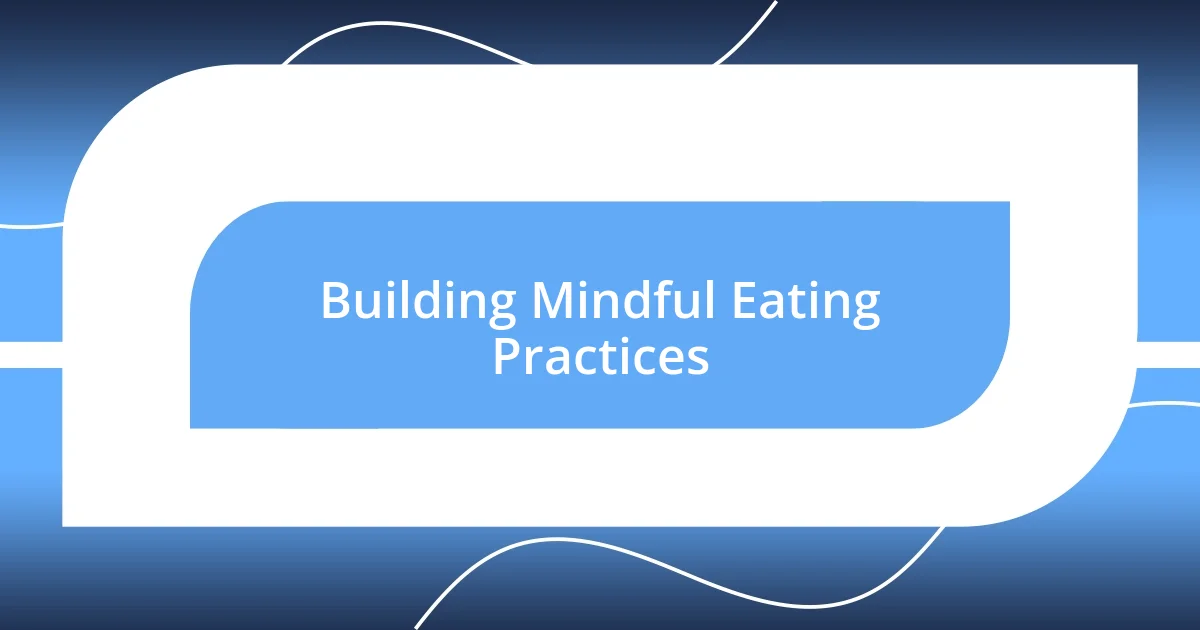
Building Mindful Eating Practices
Understanding and implementing mindful eating practices have been crucial in my transformation. One technique I’ve found incredibly valuable is the practice of eating slowly and without distractions. I remember the first time I sat down with a meal and turned off my phone—what a revelation! As I savored each bite, I noticed flavors and textures I’d overlooked in the past. It was like discovering a new world of food. Have you ever tried to actually taste your meals instead of rushing through them? The difference is profound.
Creating a dedicated eating environment also helps reinforce my commitment to mindful eating. I made it a point to set my dining space intentionally, eliminating clutter and inviting a sense of calm. For example, I light a candle or play soft music when I prepare my meals. This simple act shifts my perspective, turning what could be just a meal into a sacred moment. I encourage you to try making your eating space more inviting; you might find it changes your relationship with food entirely.
Daily practices of gratitude enhance my mindful eating experience as well. Before diving into a meal, I take a moment to appreciate where the food has come from and the effort involved in bringing it to my table. It’s remarkable how this practice adds a layer of reverence to my meals. Have you ever considered what you’re grateful for before you eat? That sense of appreciation makes every bite more satisfying, helping me to focus not just on filling my stomach, but on truly nourishing my body and soul.
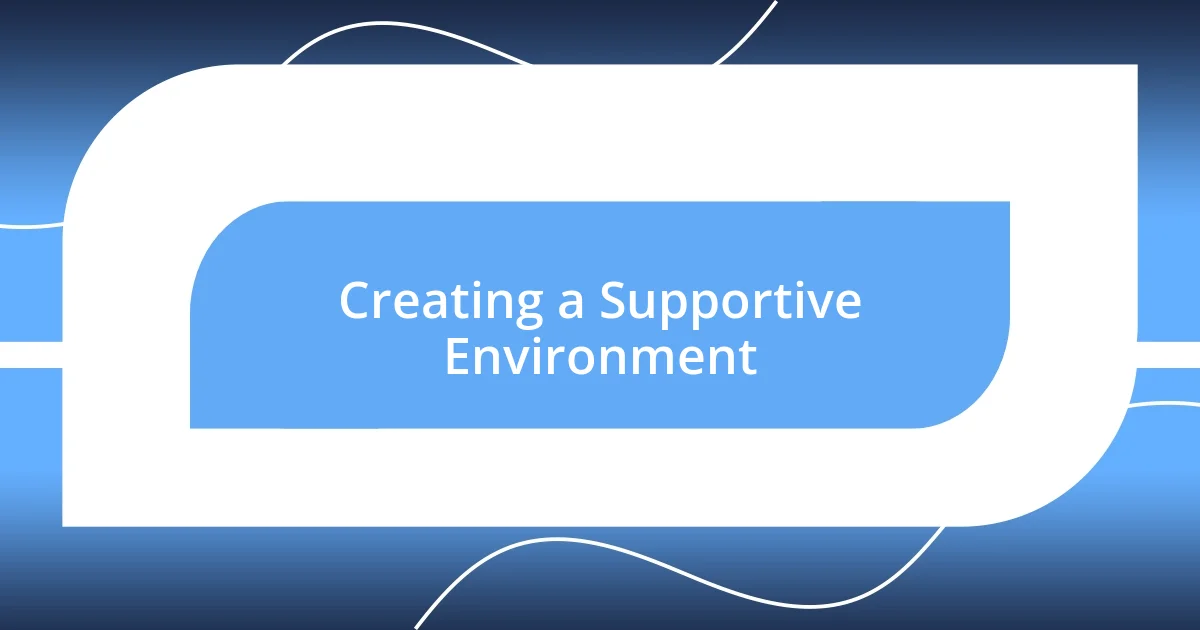
Creating a Supportive Environment
Creating a supportive environment was key to my journey of overcoming emotional eating. I remember transforming my kitchen into a space that felt inviting and encouraging rather than chaotic and stressful. For instance, I cleared out unhealthy snacks and stocked up on colorful fruits and vegetables. This small change made a noticeable difference in my mindset every time I walked into the kitchen. Have you tried adjusting your environment to support healthier choices?
Additionally, I leaned on my friends and family for support, opening up about my struggles with emotional eating. Their understanding and encouragement made me feel less isolated in this journey. I still recall a heartfelt conversation with my best friend, where we shared our personal battles—sometimes, having someone who truly listens can lighten the emotional burden. How has sharing your experiences impacted your journey?
Another significant aspect was creating routines that reinforced my goals. I began hosting weekly meal prep sessions with my sister, turning food preparation into a fun and collaborative activity. This not only kept us accountable but also fostered deeper connections through cooking and laughter. I invite you to think about how involving loved ones can enhance your commitment to change; it’s amusing how bonding over healthy meals can lead to a supportive network.
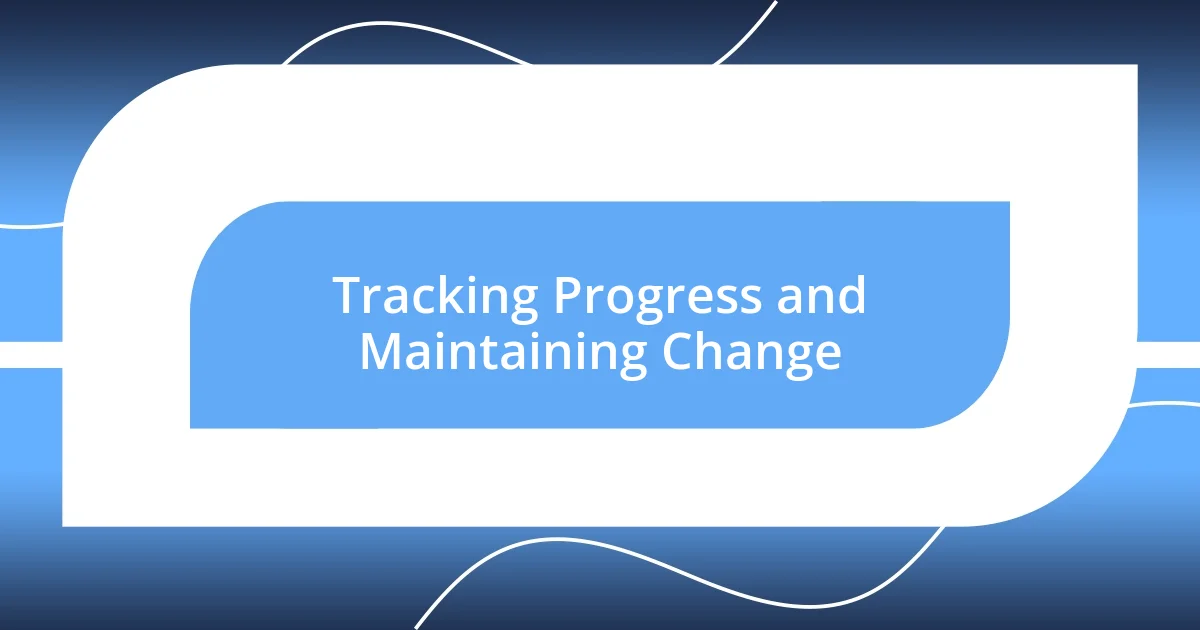
Tracking Progress and Maintaining Change
Tracking my progress has been an eye-opening experience. Initially, I started a simple journal to note my meals and emotions. I remember the first time I looked back at my entries; it revealed patterns I hadn’t seen before. For example, I realized that certain stressful days led me straight to the cookie jar. Don’t you think it’s fascinating how writing can illuminate the ties between our feelings and our eating habits?
I also set small, achievable goals for myself, which made the journey feel manageable. One of these was to replace one unhealthy snack each week with a healthier option. I can still recall the satisfaction of swapping chips for crunchy carrot sticks – it felt revolutionary! What small change could you commit to this week that might lead to big results over time? The thrill of reaching these little milestones keeps motivation levels high.
Lastly, I’ve discovered the power of reflecting on my journey regularly. Each month, I take a moment to celebrate my successes, no matter how small. This practice not only fosters positive reinforcement but also reminds me of how far I’ve come. I still get a little choked up thinking about the first time I felt content with a meal without feeling the need to overindulge. How does recognizing your achievements impact your confidence and ongoing commitment to maintaining change?
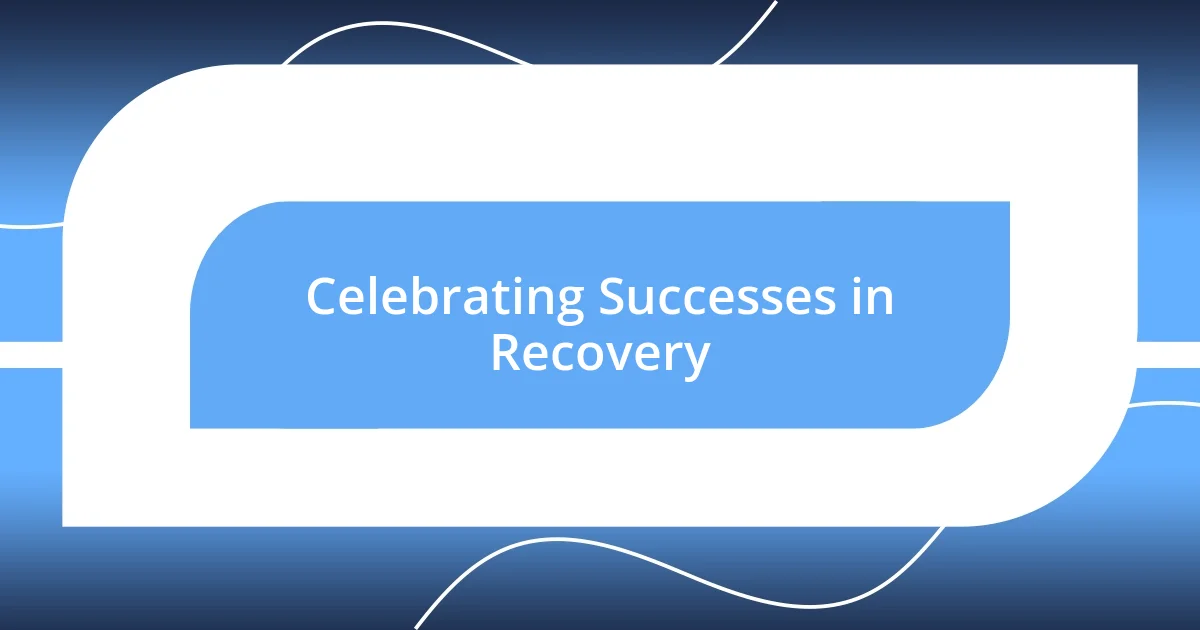
Celebrating Successes in Recovery
Celebrating my successes in recovery has become an essential part of my journey. I remember the first time I chose a mindful meal over one driven by emotion—I savored every bite of a colorful salad, relishing the fresh flavors instead of rushing through it. Isn’t it incredible how such small victories can offer a sense of fulfillment? Each of those moments reinforced my resolve to continue making healthier choices.
Every month, I dedicate a day just for reflection and celebration. I set aside time to review my progress, not just in terms of what I’ve achieved but also how I’ve grown emotionally. One particular occasion stands out; I treated myself to a small spa day after realizing I hadn’t reached for food during a stressful situation. That feeling of accomplishment and self-care was positively transformative. How do you recognize your milestones along your path to recovery?
Additionally, sharing my successes with others has been a significant boost to my emotional health. When I chat with friends about my journey, I often find myself recounting my proudest moments, like managing a stressful week without resorting to emotional eating. The joy on my friends’ faces as they celebrate with me adds a lovely layer of accountability. What about you? How does sharing your victories motivate you to keep moving forward?






